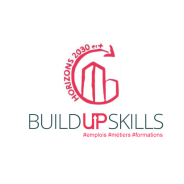Build Up Skills 2 follows on from Build Up Skills France (BUS1), which from 2011 to 2013 helped to define proposals for development up to 2020, focusing on the qualifications of construction workers in France. The first edition of Build Up Skills supported the upgrading of the skills of building professionals across Europe, to enable the construction and renovation of high energy performance buildings.
As a follow-up, BUS2 has set itself 3 objectives
-
To mobilise stakeholders and promote national dialogue between those involved in construction employment and training, based on an inventory of jobs and skills, linked to a shared diagnosis of needs in the construction sector in France (to be carried out between October 2022 and June 2023).
-
To co-construct proposals for guidelines and actions structuring a common strategy to support the performance market in construction and renovation, to encourage the recruitment and retention of workers in the sector, and to develop training associated with the necessary upgrading of the skills of professionals in the sector, in the face of the challenges of the ecological transition.
-
Carry out the exercise on a national scale and in 4 pilot employment areas.
« Build Up Skills is therefore an opportunity to produce national data and guidelines, put into perspective with local visions and shared between stakeholders! »

BUS2 as a response to 3 observations in the building sector
Mobilising the building industry is central to the environmental transition in the broadest sense (limiting the consumption of resources, reducing the artificialization of land, etc.), and in particular the climate transition. There are many ways in which the building industry can respond to environmental challenges, including :
- Sobriety
- Energy and material efficiency
- Decarbonising heat
- Carbon storage in materials
The ecological transition is just one of the challenges for the future of the building industry. In fact, the sector is on the cusp of major change. In fact, its future is shaped by :
-
2 major trends :
- The ageing of the French population.
- The accumulation of systemic risks (cyclical economic crises, climate change, loss of biodiversity).
-
3 major uncertainties:
- What resources will be available?
- How quickly will the players evolve?
- What form will this evolution take?
Although the orders of magnitude of the levers of action for the environmental transition have been established by the different scenarios, there are no shared figures for the associated employment needs, and they are not comparable with each other, mainly because of :
- Differences in the scope of the scenarios.
- The methodology used to calculate the figures.
A project organized in 2 phases
Identification and mobilisation of all stakeholders, public and private, at national level and in 4 areas of the sector (renovation, construction, tertiary, residential)
Carrying out a shared national diagnosis of requirements in terms of jobs, trades and skills in the light of market dynamics in the building sector, based on :
-
An inventory of jobs and skills in the building sector between 2012 and 2021: a description of the building sector, its links with other sectors, and market trends; statistical data; national policies; strategies for achieving the European Union's targets for 2029; training available and to be created; skills gaps; obstacles to skills upgrading, etc.
-
"Building performance market" scenarios compared with "jobs and skills" scenarios: The aim is to supplement knowledge of skills requirements with a vision of how the market will be structured.
-
Putting a figure on human resources requirements (FTEs, types of profession and skill levels) up to 2030, by segment (renovation of housing, tertiary sector and new construction), and drawing up and discussing "building energy renovation markets" scenarios and "jobs and skills" scenarios.
-
Evaluation of the effectiveness of the "BUS 1" roadmap: based on individual interviews, focus groups and discussions at national level.
-
Bibliographic study and summary of qualitative and quantitative data, with a focus on low-energy building and renovation.
The aim? To arrive at a clear, shared view of the opportunities, obstacles and challenges in the French building sector. Stakeholders were therefore asked to react, complete and validate the diagnosis at 2 levels (national and local), with dedicated working groups: one on the "building market", and the other on "employment and skills", then in a national plenary session.
Co-construction of proposals for action and an operational plan for the period 2023-2030 involving all the stakeholders: building industry professionals, employment players, apprenticeship and training players, the State, public agencies, local authorities and territories that carry out public policies, etc. They were all involved in this task through interviews, working groups and an online consultation, before the proposals for action were finalised. These were then presented to key decision-makers at national level and in the 3 participating regions, before being officially signed by national, regional and local decision-makers.
